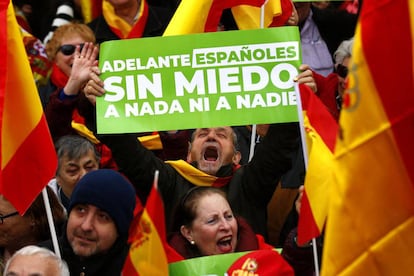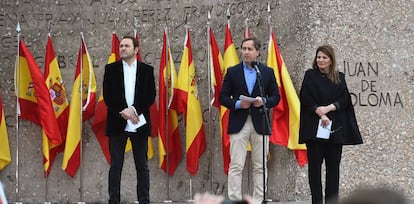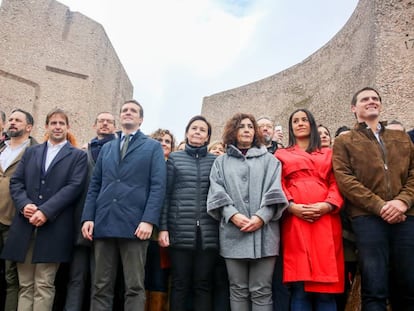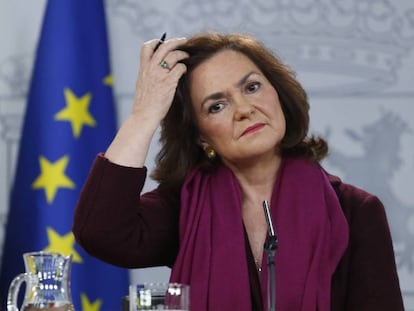How Spain’s right-wing parties misled protesters at anti-government march
EL PAÍS debunks four false accusations made against Spanish Prime Minister Pedro Sánchez in a joint manifesto from the Popular Party, Ciudadanos and Vox


Three of Spain’s right-wing parties made a series of false accusations at a protest on Sunday in Madrid against the Spanish government of Socialist Party (PSOE) Prime Minister Pedro Sánchez and his handling of the Catalan separatist drive.
At the end of the protest, called by conservative Popular Party (PP), center-right group Ciudadanos (Citizens) and far-right newcomer Vox, a trio of journalists read out the manifesto that had been agreed on by the three parties. But this manifesto contained inaccurate statements and accused Sánchez of taking action similar to that taken by former PP governments. Here are four examples:
1. “After months of intolerable concessions, the government decided to stab the law and the Spanish justice system in the back by accepting the terms and demands made by the Catalan regional premier.”
The Spanish government has not accepted any terms and demands from Catalan premier Quim Torra. Indeed on Friday, the government broke off negotiations with the Catalan regional government because it did not accept its main demand: the recognition of Catalan self-determination in upcoming cross-party talks. Nor did the government agree to negotiate benefits for Catalonia in contravention of the Constitution. Instead it proposed the opening of dialogue that would look at initiatives to address the conflict in the region, and agreed to the presence of an observer, who would act as a cross between a rapporteur, a mediator and a notary, at the talks.

The government also refused to accept Catalan demands that it call on the public prosecutor to soften the rebellion charges against separatists leaders awaiting trial in the Supreme Court for their involvement in the illegal independence referendum held in Catalonia on October 1, 2017, and the subsequent unilateral declaration of independence that was passed through parliament several weeks later.
2. “The government agreed to move [pro-independence] politicians in the Lledoners jail [in Barcelona]. It agreed to accept bilateralism between equals at the Pedralbes meeting.”
The separatist leaders have spent as much time in pre-trial detention in Madrid (November 2017 to July 2018 in Madrid) as in Barcelona (July 2018 to February 2019). After Sánchez came to power through a no-confidence motion against PP leader Mariano Rajoy in June 2018, the Interior Ministry decided to move the separatists to a prison closer to their families – something that happens for all prisoners, except members of now-defunct Basque terror group ETA.
The government has not accepted any terms and demands from Catalan premier Quim Torra
Sánchez is accused of accepting bilateralism because the central government sat down with the Catalan government at a meeting at the Pedralbes palace in Barcelona. But this bilateralism also existed under Rajoy – in 2012 the PP leader met with then-Catalan premier Artur Mas to reach an agreement for a new financing plan for Catalonia.
3. “Pedro Sánchez accepted Torra’s 21 conditions.”
Sánchez has not accepted any of the conditions from the Catalan premier. He has not recognized Catalonia’s right to self-determination, nor has he agreed to international mediation with Catalan leaders on an equal standing, or to investigate alleged police and economic abuse against Catalonia, or to stop the trial against the Catalan separatist leaders. The prime minister has never stated that there are restrictions on basic rights in Spain, or that the far right works complicity with judges and prosecutors, or agreed to open a debate on the Spanish monarchy.
4. “The government ceded at the beginning of the negotiations to get the budget approved, offering in exchange national sovereignty.”
The PSOE government has at no time granted sovereignty to Catalonia. Indeed the pro-Catalan independence groups Catalan Republican Left (ERC) and the Catalan European Democratic Party (PDeCAT) announced that they would veto the budget plan entirely.
English version by Melissa Kitson.
Tu suscripción se está usando en otro dispositivo
¿Quieres añadir otro usuario a tu suscripción?
Si continúas leyendo en este dispositivo, no se podrá leer en el otro.
FlechaTu suscripción se está usando en otro dispositivo y solo puedes acceder a EL PAÍS desde un dispositivo a la vez.
Si quieres compartir tu cuenta, cambia tu suscripción a la modalidad Premium, así podrás añadir otro usuario. Cada uno accederá con su propia cuenta de email, lo que os permitirá personalizar vuestra experiencia en EL PAÍS.
¿Tienes una suscripción de empresa? Accede aquí para contratar más cuentas.
En el caso de no saber quién está usando tu cuenta, te recomendamos cambiar tu contraseña aquí.
Si decides continuar compartiendo tu cuenta, este mensaje se mostrará en tu dispositivo y en el de la otra persona que está usando tu cuenta de forma indefinida, afectando a tu experiencia de lectura. Puedes consultar aquí los términos y condiciones de la suscripción digital.

